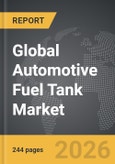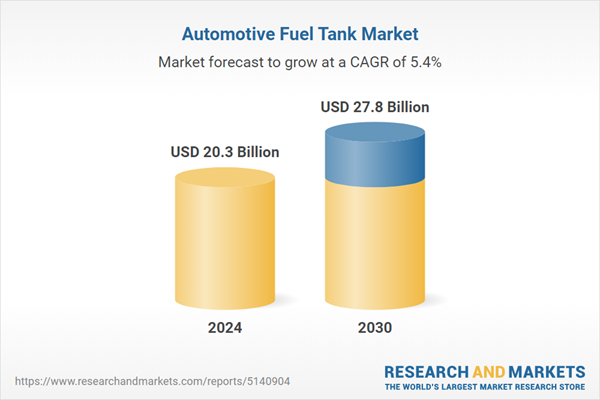Global Automotive Fuel Tank Market - Key Trends and Drivers Summarized
What Are the Critical Roles and Challenges of Automotive Fuel Tanks?
Automotive fuel tanks are fundamental components in vehicles, responsible for safely storing and supplying fuel to the engine. Beyond merely holding fuel, these tanks must meet stringent safety, environmental, and durability standards to prevent leaks, withstand impacts, and handle various fuel types, including gasoline, diesel, and alternative fuels. The materials used in fuel tank construction have evolved from traditional steel to advanced polymers and composites, which offer better resistance to corrosion, lower weight, and enhanced durability. However, the increased complexity of modern fuel systems, including the integration of electronic components like fuel pumps and sensors, has posed additional challenges for manufacturers. Ensuring the compatibility of fuel tanks with different fuel formulations, such as ethanol blends or biofuels, further adds to the complexity, making the design and production of fuel tanks a sophisticated and critical aspect of automotive engineering.How Are Regulatory Pressures and Environmental Concerns Shaping Fuel Tank Design?
The automotive fuel tank market is significantly influenced by regulatory pressures and environmental concerns, which have driven innovation and changes in design and materials. Stringent emissions regulations, particularly regarding evaporative emissions, have necessitated the development of fuel tanks with advanced vapor management systems. This has led to the adoption of multi-layered fuel tanks that incorporate barrier materials to minimize fuel permeation. Additionally, the push towards reducing vehicle weight to enhance fuel efficiency and reduce emissions has accelerated the shift from traditional steel tanks to plastic fuel tanks, which are lighter and offer greater design flexibility. The automotive industry's increasing focus on sustainability and recyclability is also prompting manufacturers to explore eco-friendly materials and production processes. These trends underscore the critical role of regulatory frameworks and environmental imperatives in shaping the evolution of automotive fuel tank technologies.What Are the Technological Advancements Transforming Fuel Tank Manufacturing?
Technological advancements are playing a pivotal role in transforming the manufacturing and functionality of automotive fuel tanks. The development of high-density polyethylene (HDPE) and other advanced polymers has revolutionized fuel tank design, enabling the production of lightweight, durable, and corrosion-resistant tanks. Additionally, the use of blow molding technology has allowed for the creation of complex shapes that maximize space utilization within the vehicle chassis while maintaining structural integrity. Another significant innovation is the integration of fuel tanks with in-tank fuel pumps and sensors, which monitor fuel levels, pressure, and temperature, contributing to more efficient fuel management systems. Moreover, the growing trend towards modular fuel tank designs is enabling automakers to standardize components across different vehicle models, reducing costs and streamlining production. These technological advancements are not only enhancing the performance and reliability of fuel tanks but also opening up new opportunities for innovation in vehicle design.What Are the Key Drivers Fueling the Growth of the Automotive Fuel Tank Market?
The growth in the automotive fuel tank market is driven by several factors, each contributing to the increasing demand and evolution of this crucial vehicle component. The rising global production of vehicles, particularly in emerging markets, is a significant driver, creating sustained demand for fuel tanks across different vehicle segments. Additionally, the trend towards lighter and more fuel-efficient vehicles has spurred the adoption of advanced plastic fuel tanks, which offer weight reduction and improved fuel economy. Consumer behavior also plays a critical role, as the growing preference for vehicles with larger fuel tanks, particularly in regions with limited refueling infrastructure, drives demand for tanks with increased capacity. Furthermore, the shift towards alternative fuels, such as compressed natural gas (CNG) and hydrogen, is creating new opportunities for specialized fuel tank designs tailored to these fuel types. Regulatory requirements, particularly those focused on emissions and fuel economy, continue to compel automakers to innovate in fuel tank design and materials, further driving market growth. Collectively, these factors are shaping a dynamic and rapidly evolving market, with significant opportunities for both established manufacturers and new entrants.Report Scope
The report analyzes the Automotive Fuel Tank market, presented in terms of market value (USD). The analysis covers the key segments and geographic regions outlined below.- Segments: Capacity (Below 45 Liters, 45 - 70 Liters, Above 70 Liters); Material (Plastic, Aluminum, Steel).
- Geographic Regions/Countries: World; United States; Canada; Japan; China; Europe (France; Germany; Italy; United Kingdom; Spain; Russia; and Rest of Europe); Asia-Pacific (Australia; India; South Korea; and Rest of Asia-Pacific); Latin America (Argentina; Brazil; Mexico; and Rest of Latin America); Middle East (Iran; Israel; Saudi Arabia; United Arab Emirates; and Rest of Middle East); and Africa.
Key Insights:
- Market Growth: Understand the significant growth trajectory of the Plastic Material segment, which is expected to reach US$12.8 Billion by 2030 with a CAGR of 6%. The Aluminum Material segment is also set to grow at 5.2% CAGR over the analysis period.
- Regional Analysis: Gain insights into the U.S. market, valued at $5.3 Billion in 2024, and China, forecasted to grow at an impressive 8.5% CAGR to reach $6.5 Billion by 2030. Discover growth trends in other key regions, including Japan, Canada, Germany, and the Asia-Pacific.
Why You Should Buy This Report:
- Detailed Market Analysis: Access a thorough analysis of the Global Automotive Fuel Tank Market, covering all major geographic regions and market segments.
- Competitive Insights: Get an overview of the competitive landscape, including the market presence of major players across different geographies.
- Future Trends and Drivers: Understand the key trends and drivers shaping the future of the Global Automotive Fuel Tank Market.
- Actionable Insights: Benefit from actionable insights that can help you identify new revenue opportunities and make strategic business decisions.
Key Questions Answered:
- How is the Global Automotive Fuel Tank Market expected to evolve by 2030?
- What are the main drivers and restraints affecting the market?
- Which market segments will grow the most over the forecast period?
- How will market shares for different regions and segments change by 2030?
- Who are the leading players in the market, and what are their prospects?
Report Features:
- Comprehensive Market Data: Independent analysis of annual sales and market forecasts in US$ Million from 2024 to 2030.
- In-Depth Regional Analysis: Detailed insights into key markets, including the U.S., China, Japan, Canada, Europe, Asia-Pacific, Latin America, Middle East, and Africa.
- Company Profiles: Coverage of players such as Central Precision Ltd., Compagnie Plastic Omnium, Kautex Textron GmbH & Co. KG, Magna International, Inc., Martinrea International Inc. and more.
- Complimentary Updates: Receive free report updates for one year to keep you informed of the latest market developments.
Some of the 42 companies featured in this Automotive Fuel Tank market report include:
- Central Precision Ltd.
- Compagnie Plastic Omnium
- Kautex Textron GmbH & Co. KG
- Magna International, Inc.
- Martinrea International Inc.
- TI Automotive
- Unipres Corporation
- Yachiyo Industry Co., Ltd.
- YAPP Automotive Systems Co., Ltd.
This edition integrates the latest global trade and economic shifts into comprehensive market analysis. Key updates include:
- Tariff and Trade Impact: Insights into global tariff negotiations across 180+ countries, with analysis of supply chain turbulence, sourcing disruptions, and geographic realignment. Special focus on 2025 as a pivotal year for trade tensions, including updated perspectives on the Trump-era tariffs.
- Adjusted Forecasts and Analytics: Revised global and regional market forecasts through 2030, incorporating tariff effects, economic uncertainty, and structural changes in globalization. Includes historical analysis from 2015 to 2023.
- Strategic Market Dynamics: Evaluation of revised market prospects, regional outlooks, and key economic indicators such as population and urbanization trends.
- Innovation & Technology Trends: Latest developments in product and process innovation, emerging technologies, and key industry drivers shaping the competitive landscape.
- Competitive Intelligence: Updated global market share estimates for 2025, competitive positioning of major players (Strong/Active/Niche/Trivial), and refined focus on leading global brands and core players.
- Expert Insight & Commentary: Strategic analysis from economists, trade experts, and domain specialists to contextualize market shifts and identify emerging opportunities.
Table of Contents
Companies Mentioned (Partial List)
A selection of companies mentioned in this report includes, but is not limited to:
- Central Precision Ltd.
- Compagnie Plastic Omnium
- Kautex Textron GmbH & Co. KG
- Magna International, Inc.
- Martinrea International Inc.
- TI Automotive
- Unipres Corporation
- Yachiyo Industry Co., Ltd.
- YAPP Automotive Systems Co., Ltd.
Table Information
| Report Attribute | Details |
|---|---|
| No. of Pages | 244 |
| Published | February 2026 |
| Forecast Period | 2024 - 2030 |
| Estimated Market Value ( USD | $ 20.3 Billion |
| Forecasted Market Value ( USD | $ 27.9 Billion |
| Compound Annual Growth Rate | 5.4% |
| Regions Covered | Global |









